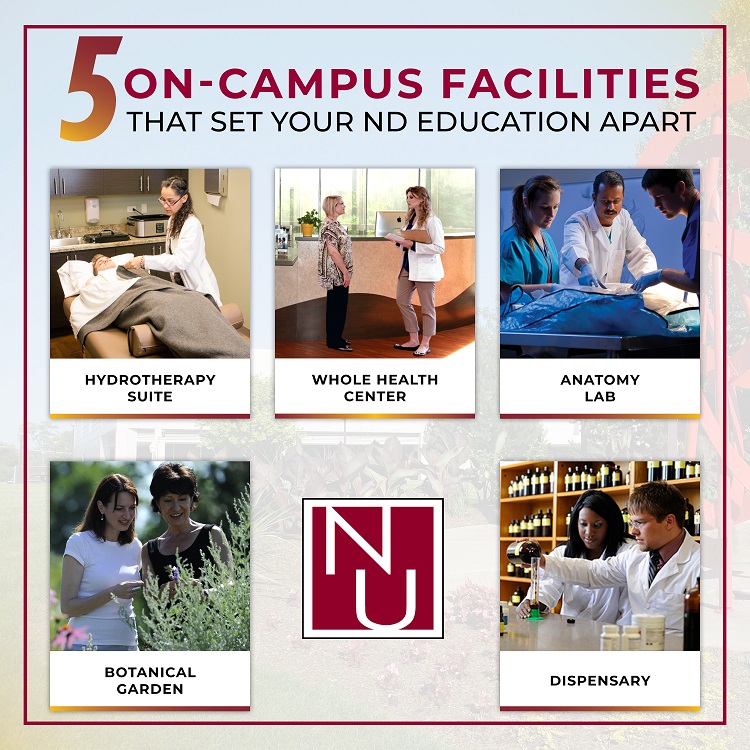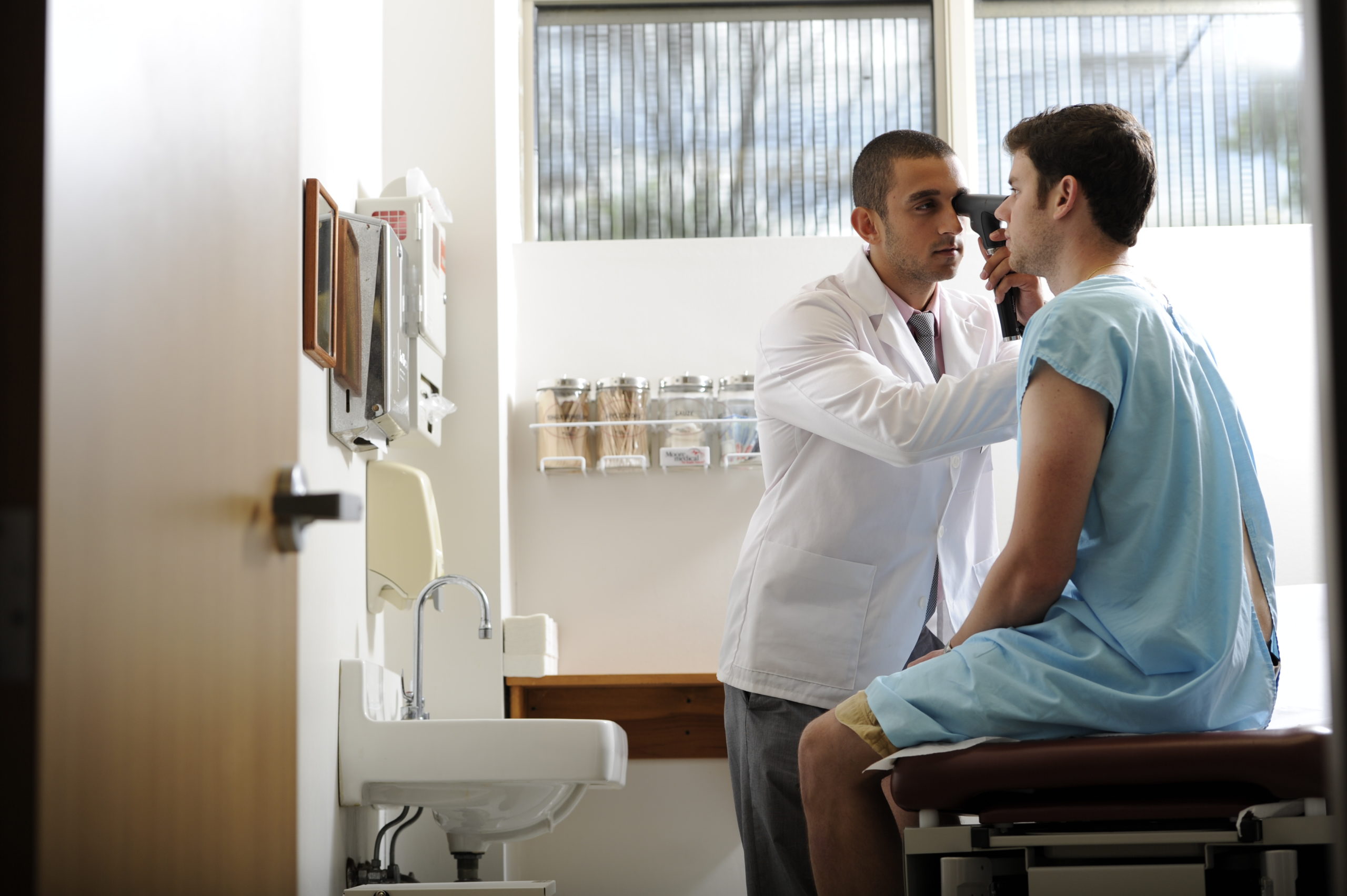In today’s increasingly virtual world, many degree programs have permanently gone online. Health care, however, has largely remained an exception. No matter what the discipline, health care is inherently hands-on. Therefore, it is important that your naturopathic medicine education is hands-on too. Not only does hands-on learning help you prepare for a hands-on profession, it often makes the coursework easier to understand and more enjoyable to learn.
At NUHS, students have a long list of opportunities for hands-on learning. Outside of the classroom, NUHS students have access to clinical opportunities both on-campus at the NUHS Whole Health Center clinic and at other busy clinics in Chicago and other parts of Illinois.
NUHS has worked to keep a variety of hands-on opportunities available because it recognizes the impact these opportunities have on preparing students for practice. Here are some reasons why a naturopathic medicine (ND) education, in particular, should be hands-on.
You’ll gain a deeper understanding of your coursework
One of the most hands-on aspects of an ND education at NUHS is the full-year clinical internship. Our on-campus Whole Health Center features a hydrotherapy suite and large herbal and supplement dispensary, allowing students to work with advanced treatment tools and prepare remedies and supplements. Another major hands-on component of the ND program is a full year of human dissection at the state-of-the-art anatomy lab.
Compared to a curriculum that consists solely of lectures, doing this kind of hands-on work keeps you both engaged and attentive. It allows you to not only retain more information, but to have a deeper understanding of what you’re learning and how it applies to the work you’ll be performing in your profession.

Learning will be more enjoyable
In addition to focusing on the body’s own healing power, naturopathic medicine uses less-invasive techniques like botanical remedies to treat various health conditions. As part of your coursework in ND program, you’ll have the chance to learn about various botanicals and their potential uses in health care not just in the classroom, but first-hand in the student-led botanical garden located on campus.
Enabling students to actually touch, feel and smell the plants they study, makes the entire process much more enjoyable than simply reading about them in a textbook. The NUHS botanical garden is maintained on an entirely volunteer basis and has remained popular among students for 10 years. On top of being enjoyable, students report that working in the garden helps them stay relaxed during mid-terms and finals too.
You’ll feel more accomplished
A common reason students enter into the health care field is the ability to make a difference in a patient’s life. Since working hands-on allows you to see results first-hand, you will be able to take more pride in the work you do everyday. You’ll feel more motivated and excited to begin each day.
With all the hands-on clinical opportunities available to NUHS students, you’ll have the chance to help various types of patient populations. One such opportunity at the Salvation Army clinic in Chicago allows interns to see a wide variety of patients who are often homeless, suffering from drug and alcohol addiction, needing transitional housing after an incarceration or recovering from a major life tragedy. If you’re looking to make a difference in a patient’s life, treating the medically underserved at the Salvation Army clinic is just one opportunity to help you feel more accomplished in your work.
It can help you decide which specialty to pursue
Within the field of naturopathic medicine, there are several different specialties you can pursue–whether it’s pediatric, women’s health care, cancer treatment or homeopathy. The best way to decide which is best for you isn’t necessarily by reading a textbook or reviewing a list of possible options. Actually performing the work of your future profession is a much more superior way of helping you decide what’s right for your career.
Putting what you learn into practice will allow you to identify what you enjoy and consider your strengths and weaknesses. For example, a homeopathy rotation at the Center for Integral Health (CIH) is a great way to explore constitutional homeopathic case-taking and prescribing. At CIH, students work alongside Timothy Fior, MD, and Lisa Krebs, ND, a National University alumnae, who are both in practice at CIH.
Additionally, at the Whole Health Center on campus, you’ll work alongside various other health professionals such as acupuncture and Oriental Medicine practitioners, and chiropractic physicians. You’ll also treat patients using various modalities and specialties such as hydrotherapy and botanical medicine. Even before you graduate, you’ll be able a get a taste of various potential career paths.

You’ll be able to work closely with and learn from fellow students
On a weekly basis, ND students engage in Grand Rounds, a medical tradition that involves exploring a clinical question usually through recent cases encountered at the on-campus clinic or other internship work. These interactive group sessions consist of fellow interns presenting patient cases and the treatment methods they utilized to treat them. For years, Grand Rounds has helped students learn from each other’s unique experiences.
From time to time, Grand Rounds has also hosted various experts who share their own patient experiences. Whether it’s from students, visiting experts or our own expert faculty, at NUHS, you’ll be able to learn from a variety of engaging and helpful sources.
NUHS is not alone in recognizing the importance of hands-on learning. The states that license NDs in the United States also recognize that a high quality ND education must be rigorous and hands-on. In order to sit for the exam required to qualify for licensure, NDs must graduate from a program accredited by The Council on Naturopathic Medical Education (CNME). Online ND programs are not accredited, thus – those programs do not qualify individuals for licensure.
We believe that not only what you learn, but the way you learn, can greatly impact how you perform in your future profession. The various hands-on opportunities at NUHS are meant to elevate your learning experience, allowing you to take what you learn in the classrooms and apply it with confidence to real patients as an intern and eventually as a professional physician. If you’re looking for an education that’s as hands-on as possible, National University provides some of the most unique hands-on opportunities available. To learn more about the NUHS naturopathic medicine program, visit the NUHS website.
{{cta(‘e2bbb13c-0841-4021-80f7-62bf3f520a39’)}}




0 Comments